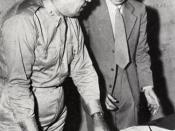Everyone said that they wanted limits on nuclear arms. So who was responsible for humankind's failure to impose any meaningful limits on them? Was it the American military, the presidents, leaders of Congress, the public, their Soviet or even West European counterparts? In reality, the true 'villains' of the story were the military and their conservative allies. These groups and their use of aggression, intimidation, power politics and nuclear diplomacy (initially brought about by the American monopoly of the atomic bomb) to settle conflicts within Soviet-American relations allowed the arms race to escalate. Right wing officials with militant aims, specific interest groups that had something to gain and the competition of the armed services with each other helped influence and shape the nuclear arms race and nuclear arms talks.
The fact was that most of the Cold War era presidents had little diplomatic and military experience and often relied upon the aid of a limited number of advisors to make decisions on the arms control efforts and other nuclear policies.
Therefore, the administration was influenced by the extreme pressures to not give the Soviets any leniency, which came from inside the government, and by specific interest groups that were highly organized and effective at attacking the opponents of their proposals to contain the communists. These attacks, in turn, helped the conservative right to postpone nuclear arms talks in favor of nuclear build up, and throughout the decades resulted in the failure of peace negotiation (106).
The beginnings of problems of American policy were seen early in the experiments with the atom. In order to keep secrecy and preserve national security, Brigadier General Leslie Groves, who was in command of the Manhattan Project, developed a system called "compartmentalization". The system disseminated crucial information among scientists only on a need-to-know basis.



Cold war...YAY!!!
I just got done with the book "Blind Man's Bluff", and I just want to recommend it to you, if you enjoy things like underwater submarine espionage.
1 out of 1 people found this comment useful.